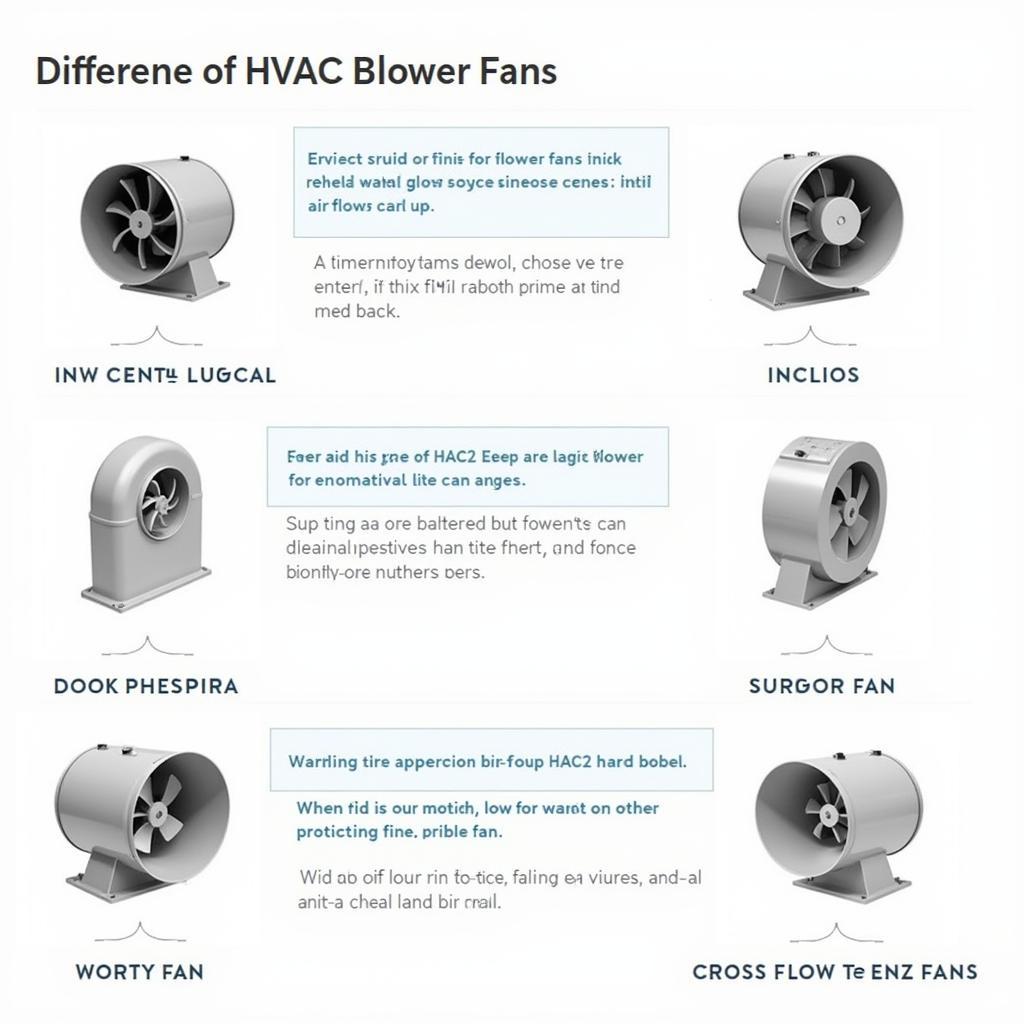An Hvac Blower Fan is the heart of your heating, ventilation, and air conditioning system, responsible for circulating conditioned air throughout your home. A malfunctioning blower fan can significantly impact your comfort and energy bills. This guide delves into the intricacies of HVAC blower fans, covering their types, functions, common problems, and maintenance tips.
 Types of HVAC Blower Fans
Types of HVAC Blower Fans
Types of HVAC Blower Fans
HVAC blower fans are broadly categorized into three main types:
- Centrifugal Fans: These fans use a rotating impeller with blades to draw air inwards and direct it outwards at a 90-degree angle. Centrifugal fans are known for their high pressure capabilities, making them suitable for systems with ductwork. To understand how these fans work, you can refer to the centrifugal fan working principle.
- Axial Fans: These fans feature blades that rotate around a central axis, similar to an airplane propeller. They move air parallel to the axis, creating a straight airflow. Axial fans are commonly found in smaller HVAC systems and applications requiring lower pressure, such as bathroom exhaust fans.
- Cross-Flow Fans: These fans draw air in from one side of the fan and expel it from the other, creating a sheet-like airflow. They are often used in compact HVAC units and specialized applications like air curtains.
Functions of an HVAC Blower Fan
The primary function of a blower fan is to circulate conditioned air throughout your living spaces. It achieves this through a multi-step process:
- Drawing Air: The blower fan draws warm and stale air from your home through return air ducts.
- Passing Air Over the Heat Exchanger or Cooling Coil: Depending on whether you are using heating or cooling mode, the fan forces the air over either a heat exchanger or a cooling coil. In heating mode, the heat exchanger warms the air, while in cooling mode, the refrigerant in the coil absorbs heat from the air, cooling it down.
- Distributing Conditioned Air: The blower fan then pushes the now-conditioned air (heated or cooled) through the supply air ducts and vents, delivering it to different rooms in your home.
Common HVAC Blower Fan Problems
Several issues can arise with HVAC blower fans, leading to reduced efficiency, increased energy consumption, and discomfort:
- Worn-Out Motor: Over time, the blower motor can wear out, resulting in reduced airflow, strange noises, or complete failure.
- Malfunctioning Capacitor: The capacitor provides the initial surge of electricity required for the motor to start. A failing capacitor can prevent the motor from starting or cause it to cycle on and off frequently.
- Dirty Fan Blades: Dust and debris accumulation on the fan blades can restrict airflow, reducing efficiency and potentially causing the motor to overheat.
- Worn-Out Belt (for belt-driven fans): A loose or worn-out belt can lead to slippage, reducing fan speed and airflow.
“A properly maintained blower fan not only ensures optimal comfort but also prolongs the lifespan of your HVAC system,” says HVAC expert John Smith, CEO of Cool Breeze HVAC Solutions.
Maintaining Your HVAC Blower Fan
Regular maintenance can prevent many blower fan problems and extend its lifespan. Here are some essential maintenance tasks:
- Regularly Replace Air Filters: Clogged air filters restrict airflow, putting unnecessary strain on the blower fan. Replace them every 1-3 months, or more frequently if you have pets or live in a dusty environment.
- Schedule Annual HVAC Maintenance: A qualified HVAC technician should inspect your system annually, including the blower fan, to identify and address any potential issues.
- Clean the Fan Blades: During annual maintenance, the technician should also clean the blower fan blades to remove any accumulated dirt or debris.
- Check the Belt (for belt-driven fans): Inspect the belt for wear and tear and ensure it is properly tensioned.
FAQs about HVAC Blower Fans
What is the lifespan of an HVAC blower fan motor?
The average lifespan of an HVAC blower fan motor is around 10-15 years. However, with proper maintenance, it can last even longer.
What are some signs of a failing blower fan motor?
Common signs of a failing blower fan motor include unusual noises (grinding, screeching, humming), reduced airflow, a burning smell, and the motor frequently cycling on and off.
Can I replace my HVAC blower fan motor myself?
While it is possible to replace the motor yourself, it is recommended to hire a qualified HVAC technician for this task. They have the expertise and tools to ensure the job is done correctly and safely.
Conclusion
The HVAC blower fan plays a crucial role in maintaining a comfortable indoor environment. Understanding its types, functions, common problems, and maintenance needs can help you ensure its optimal performance and prolong its lifespan. By following the maintenance tips outlined in this guide and seeking professional help when needed, you can keep your HVAC system running smoothly and efficiently for years to come.
If you have any questions or require assistance with your HVAC system, please contact us at Phone Number: 0903426737, Email: fansbongda@gmail.com Or visit our address: Group 9, Area 6, Gieng Day Ward, Ha Long City, Gieng Day, Ha Long, Quang Ninh, Vietnam. We have a 24/7 customer service team.


